Podcast: Play in new window | Download
In this Adventure in Etymology we unravel the roots of the word minion.
A minion [ˈmɪnjən] is:
- A loyal servant of another, usually a more powerful being.
- A sycophantic follower.
- A small, yellow creature that appears in the Despicable Me and Minions films.
It used to mean:
- A loved one; one highly esteemed and favoured.
- Favoured, beloved
It comes from Middle French mignon (lover, favourite, darling), from Old French mignon (dainty, pleasing, gentle, kind), from Frankish *minnju (love, friendship, affection, memory), from Proto-Germanic *minþijō, (affectionate thought, care), from PIE *men- (to think, mind) [source].
Related words in Engish include minionette (small, delicate), minionlike (resembling a minion, finely, daintily), and miniondom (the realm, sphere, or world of minions; minions collectively).
Words from the same PIE roots include mignon (cute, sweet, lovely) in French, manit (to notice, observe, perceive) in Lithuanian, monieren (to criticize, complain) in German, mostrare (to show, indicate, point) in Italian, mynwent (graveyard, cemetery) in Welsh, and admonish, mantra, mind, monitor, monster, monument and summon in English [source].
You can also listen to this podcast on: Apple Podcasts, Amazon Music, TuneIn, Podchaser, Podbay or Podtail and other pod places.
The theme tune for this podcast is The Unexpected Badger / Y Mochyn Daear Annisgwyl, a piece I wrote and recorded in 2017.
If you would like to support this podcast, you can make a donation via PayPal or Patreon, or contribute to Omniglot in other ways.
Radio Omniglot podcasts are brought to you in association with Blubrry Podcast Hosting, a great place to host your podcasts. Get your first month free with the promo code omniglot.
I also write about words, etymology and other language-related topics on the Omniglot Blog, and I explore etymological connections between Celtic languages on the Celtiadur blog.













